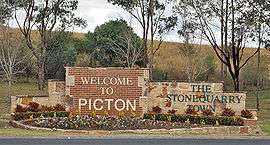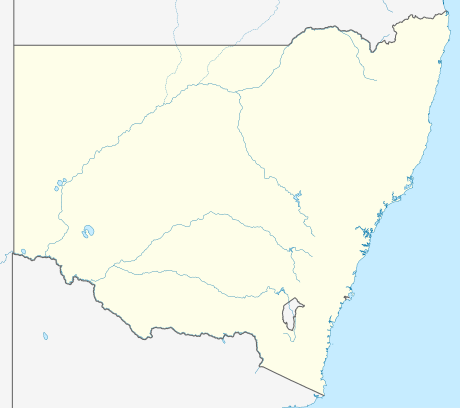Picton, New South Wales
| Picton New South Wales | |||||||
|---|---|---|---|---|---|---|---|
 | |||||||
 Picton | |||||||
| Coordinates | 34°11′S 150°36′E / 34.183°S 150.600°ECoordinates: 34°11′S 150°36′E / 34.183°S 150.600°E | ||||||
| Population | 4,595 (2011 census)[1] | ||||||
| Established | 1841 | ||||||
| Postcode(s) | 2571 | ||||||
| Elevation | 165 m (541 ft) | ||||||
| Location |
| ||||||
| LGA(s) | Wollondilly Shire | ||||||
| Region | Macarthur | ||||||
| State electorate(s) | Wollondilly | ||||||
| Federal Division(s) | Hume | ||||||
| |||||||
Picton is a small town in the Macarthur Region of New South Wales, Australia, in the Wollondilly Shire, on the south-western edge of Sydney. The town is located 80 kilometres south-west of Sydney, close to Camden and Campbelltown. It is also the administrative centre of Wollondilly Shire.
History
Picton was first explored by Europeans in 1798 and remained beyond the limits of legal settlement until 1821. Following the discovery of good land in the interior and the settlement of Bong Bong and the Goulburn areas, Governor Macquarie authorised the building of the new Great South Road between Sydney and the Southern Highlands in 1819.[2] This opened up the Picton area to settlers, including Henry Colden Antill,[3] who established a 2,000-acre (8.1 km2) property in 1822.[2]
Picton developed when a new line of the Great South Road was cut over the Razorback Range from Camden, and especially after the railway arrived in 1863. Picton is the only town in the Southern Hemisphere where you can pass through it twice when travelling by train.[4] It was established as Stonequarry in 1841 and was renamed Picton in 1845. It remained a stopping point on the Great South Road, later renamed the Hume Highway, until it was bypassed in December 1980.
Bushfires destroyed several homes in the Nangarin Estate located on the western outskirts of Picton, from a fire front originating from Lakesland in September 2006.[5]
Landmarks
Picton is home to many historic buildings, including two types of bridges not found easily anymore elsewhere in the state - Victoria Bridge a timber trestle bridge that crosses Stonequarry Creek, opened in 1897, and the 'Picton Railway Viaduct' a stone viaduct opened in 1863 to also cross Stonequarry Creek.
The viaduct is still in use by the railways. Ghost tours are conducted in some of the historic buildings and inside the disused railway tunnel on Redbank Range, where residents and visitors claim to have experienced paranormal activity. The abandoned tunnel was used to store mustard gas spray tanks during World War II.[6]
The George IV Inn, reputedly constructed in 1839, is considered to be one of the oldest hotel buildings in Australia. The cellar contains remnants of convict shackles as prisoners being transported from Sydney to Berrima prison would often be held in Picton overnight. The barn behind the hotel may date back to 1810 and is possibly the oldest building in Picton - it is used for functions such as birthday and engagement parties. The hotel is also the location of Scharer's Little Brewery, one of the first microbreweries in Australia and winner of numerous awards for its Burragorang Bock and Scharer's Lager beers.
Nangarin Estate
Nangarin Vineyard Estate or simply Nangarin Estate is a modern village to the west and part of Picton. The estate is one of New South Wales' first residential vineyard projects. The village community manages and maintains the vineyards, residential construction and community facilities. The village is protected by legal covenants to ensure the community manages the village.[7]
Transport
Picton railway station is on the Southern Highlands line with a relatively infrequent service with trains running every 30m (peak) – 2 hours (off peak).
The town is located on the Old Hume Highway.
Sport and recreation
Picton also has both senior and junior rugby league and soccer teams.
Climate
Picton has a humid subtropical climate (Cfa) with hot summers and cool winters. Owing to its inland location and an elevated altitude, it has a relatively high diurnal range throughout the year.
| Climate data for Picton Council Depot | |||||||||||||
|---|---|---|---|---|---|---|---|---|---|---|---|---|---|
| Month | Jan | Feb | Mar | Apr | May | Jun | Jul | Aug | Sep | Oct | Nov | Dec | Year |
| Record high °C (°F) | 40.6 (105.1) |
42.8 (109) |
39.4 (102.9) |
33.1 (91.6) |
27.2 (81) |
23.8 (74.8) |
25.3 (77.5) |
26.9 (80.4) |
34.4 (93.9) |
35.6 (96.1) |
38.9 (102) |
39.6 (103.3) |
42.8 (109) |
| Average high °C (°F) | 29.3 (84.7) |
28.6 (83.5) |
27.0 (80.6) |
23.7 (74.7) |
20.2 (68.4) |
17.3 (63.1) |
16.8 (62.2) |
18.2 (64.8) |
21.4 (70.5) |
24.0 (75.2) |
26.3 (79.3) |
28.5 (83.3) |
23.4 (74.1) |
| Daily mean °C (°F) | 22.2 (72) |
22.0 (71.6) |
20.0 (68) |
16.4 (61.5) |
12.9 (55.2) |
10.2 (50.4) |
9.2 (48.6) |
10.5 (50.9) |
13.3 (55.9) |
16.4 (61.5) |
18.9 (66) |
21.2 (70.2) |
16.1 (60.98) |
| Average low °C (°F) | 15.2 (59.4) |
15.4 (59.7) |
13.1 (55.6) |
9.2 (48.6) |
5.7 (42.3) |
3.2 (37.8) |
1.7 (35.1) |
2.9 (37.2) |
5.2 (41.4) |
8.8 (47.8) |
11.5 (52.7) |
14.0 (57.2) |
8.8 (47.8) |
| Record low °C (°F) | 3.3 (37.9) |
7.2 (45) |
1.7 (35.1) |
−2.2 (28) |
−3.3 (26.1) |
−4.9 (23.2) |
−10.0 (14) |
−4.4 (24.1) |
−2.8 (27) |
−0.6 (30.9) |
2.2 (36) |
4.7 (40.5) |
−10.0 (14) |
| Average precipitation mm (inches) | 87.3 (3.437) |
91.2 (3.591) |
88.2 (3.472) |
69.7 (2.744) |
57.0 (2.244) |
66.3 (2.61) |
50.2 (1.976) |
43.7 (1.72) |
44.4 (1.748) |
64.3 (2.531) |
72.2 (2.843) |
69.8 (2.748) |
804.0 (31.654) |
| Average precipitation days (≥ 0.2 mm) | 9.4 | 9.5 | 9.6 | 7.8 | 7.0 | 7.5 | 6.6 | 6.8 | 7.2 | 8.5 | 8.7 | 8.6 | 97.2 |
| Source: Bureau of Meteorology (average temperatures, 1907-1975; records, 1965-1975)[8] | |||||||||||||
References
- ↑ Australian Bureau of Statistics (31 October 2012). "Picton (State Suburb)". 2011 Census QuickStats. Retrieved 2 February 2014.
- 1 2 "Picton". Walkabout. 2005-11-05. Retrieved 2006-11-19.
- ↑ Antill, J.M. (1966). "Antill, Henry Colden (1779–1852)". Australian Dictionary of Biography. Australian National University. Retrieved 2013-09-19.
- ↑ "Picton". The Wollondilly region of New South Wales. Stonequarry.com.au. 2005-11-05. Retrieved 2006-12-25.
- ↑ "Wild weather claims life, homes". News.com.au. 2006-09-24. Retrieved 2006-12-25.
- ↑ Australian supervised
- ↑ http://www.nangarin.com/
- ↑ "Climate statistics for Picton". Bureau of Meteorology. Retrieved 18 November 2013.